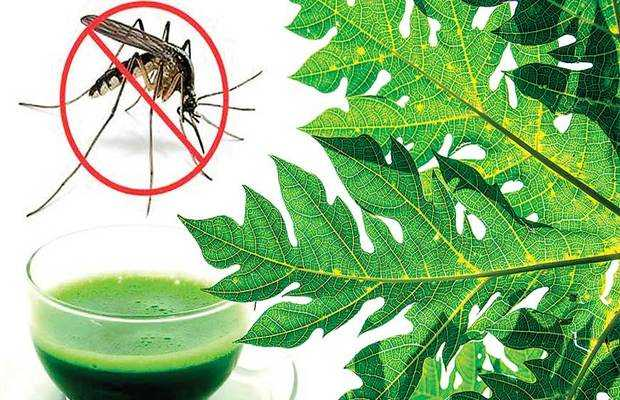The potential therapeutic effects of Carica papaya leaves have sparked widespread public and scientific interest in reducing dengue fever symptoms. C. papaya leaf juice has the ability to be a new drug candidate against dengue fever.
The utilization of medicinal plants for the inhibition and treatment of disease has been around for generations, some of which have been systematically proven.
Numerous medicinal plants, particularly those with antiviral action, have enticed the attention of researchers to produce new medicinal products for wide-ranging infectious diseases.
Carica papaya Leaves is high in phytochemicals with medicinal potential as well as the beneficial nutritional value of food. The leaves of Carica Papaya contain organic acids, carbohydrates, phenolic acids, and flavonoids. Carotenoids and alkaloids.
Did You know: Every part of the papaya plant has a bundle of medical benefits?
Benefits of Papaya juice in dengue fever:
According to the healing foods by DK, “ Papaya has strong antibacterial and antiviral properties in order to relieve the primary symptoms of dengue fever and prevent the further adverse effects”
Here is a comprehensive list of papaya juice benefits for the treatment of dengue fever.
1. Boost the Immune System:
Papaya is a superb source of vitamins A, C, K, and B and is known as a strong immune booster. It is good for the development of body tissues, including hair and skin. It helps to maintain collagen, a structural protein in connective tissue. Medium-sized papaya can provide twice the vitamins needed per day. It makes your immunity stronger to fight against germs.
Did You Know: The leaves of papaya contain digestive enzymes such as papain and chymopapain.
2. Increase Platelet Count in Blood:
Papaya leaves have a particular phytochemical called acetogenin that has been shown to proliferate blood platelet counts. It is an effective treatment for dengue patients as it confirms speedy recovery.
Papaya leaves also contain several natural botanicals like flavonoids and carotene, which have anti-inflammatory and antioxidant characteristics. They prevent harmful free radicals from damaging blood cells.
FUN FACT: Papaya has many diverse names all over the world. In Australia, people call it, “pawpaw”. In South Asia, it is occasionally called a lapayak ,lepaya, or tapaya. The name in French is “figueir des iles”, or fig of the islands. Some Spanish names for papaya are “melon zapote”, “fruta bomba” or “mamona”.
According to the study reported in the MPDI, “a study in which a suspension of 15 mg/kg of powdered Carica papaya leaves in palm oil were administered to 9 mice and were inspected for its effect on platelet counts in them. Same numbers of the animals received proper amounts of either palm oil alone or physiological saline solution.”
3. Make Digestion Effective in Dengue Patients:
The dengue patients might have suffered from digestive issues. Papaya fruit contains two enzymes: papain and chymopapain. Both enzymes are responsible for digesting protein, which can aid digestion and reduce inflammation in the dengue patients. Papain is a component of some over-the-counter digestive aids that may take part with slight gastrointestinal upset.
Both papain and chymopapain also help decrease stomach burning of the stomach during dengue fever. Furthermore, they can help with acute pain, such as burns or bruises, and with chronic inflammatory situations.
Did You Know: The leaves of papaya contain digestive enzymes such as papain and chymopapain.
4. Best for Dengue patients with Heart Problems:
If someone has been diagnosed with dengue fever and is already a heart patient, then taking papaya juice is an excellent choice. The high fiber content of papaya juice lowers the risk of heart disease in dengue patients. A high-fiber diet depresses the levels of cholesterol in the body.
Papaya contains folic acid, which is vital for altering the amino acid homocysteine into a less destructive amino acid.
High levels of homocysteine, an amino acid found chiefly in meat products, is a danger factor for heart disease. Consequently, eating papaya or drinking papaya juice in your diet may decrease this risk factor by dropping homocysteine levels.
The world needs to follow the natural methods which have medicinal properties until the proper treatment has not been developed. These natural products have shown positive results in order to cure or reduce the symptoms of dengue patients. The use of papaya leaves has been extensively used since the virus came out and fundamentally provides a better outcome in the health of patients.
FAQS:
Does papaya reduce fever?
At the moment, it is famous for treating numerous fevers such as dengue fever. Remarkably, not only papaya fruit, but also papaya leaves and seeds also have therapeutic properties and have the capacity to treat the fever.
How much papaya leaves increase the platelet count?
It has been reported that papaya leaves increase the platelets in the blood by 15 times.

